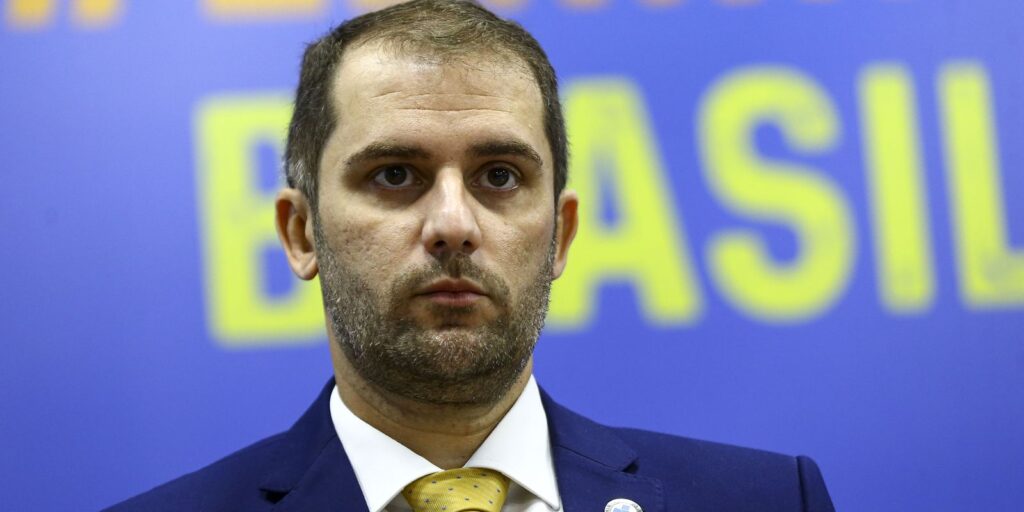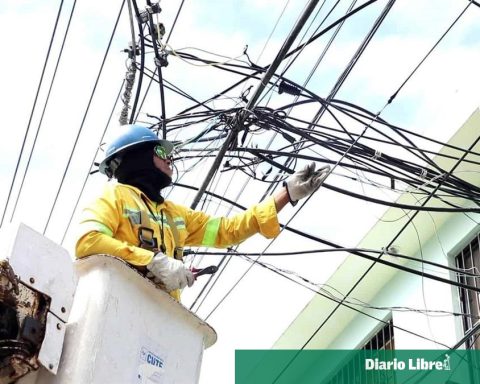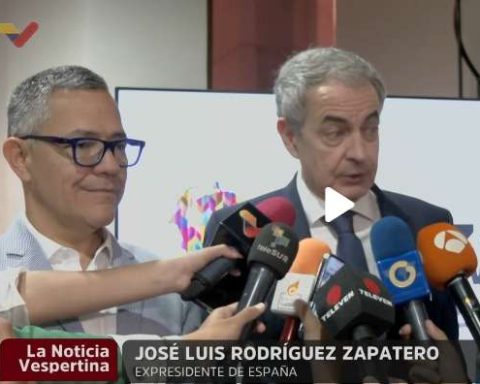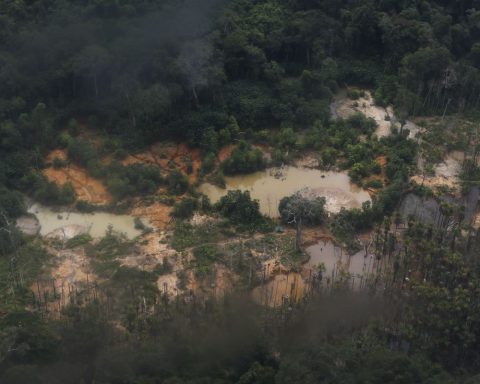“El garante”, the multi-award-winning miniseries of terror and suspense about an envoy of the Devil who arrives to claim the soul of a Buenos Aires psychologist, and who advanced the sophistication in television narratives that would arrive with the change of the millennium, turns 25 this Saturday of its premiere on Channel 9 instituted as a product that was “revolutionary” for the national audiovisual.
This is how its creator and director, Sebastián Borensztein, considers it in a talk with Télam, who on August 13, 1997 was a young man in his thirties taking his first steps in fiction after working for years on his father’s programs, the remembered Tato Bores.
“The fact that your first fiction is ‘El guarante’ is strong, I started very high”, acknowledges the also screenwriter and writer about how the series positioned it starring Lito Cruz and Leonardo Sbaragliarecipient of four Martín Fierro awards the following year, nominated around the world, later reversioned in Chile and even the first Argentine television product adapted as a book.
“The fact that your first fiction is ‘El guarantor’ is strong, I started very high”Sebastian Borensztein
Although he never returned to the horror genre, his career continued along the path of recognition, with series like “Final Time” (2000) or “Iosi, the repentant spy” (2022), and films like “A Chinese Tale” ( 2011), “Kóblic” (2016) or “The odyssey of the giles” (2019).
“The guarantor” is a paradoxical case: on the one hand, it was a pioneer in its 8-episode structure, a forerunner in the use of exteriors and perhaps the last time that horror as a genre was successfully visited in prime time television in the country. On the other, however, it always seems to be the most forgotten when it comes to listing “the best Argentine series of all time”.
Perhaps it pays the price of having arrived too soon, and for this reason it is not grouped with the groundbreaking “Final Time” -which brought the idea of the story in real time that would later become popular with the North American “24”-, “Okupas” ( 2000, by Bruno Stagnaro) or “The simulators” (2002, by Damián Szifron).

The plot of the series, which unfortunately at the moment can only be found in low quality on YouTube, debuted that Wednesday, August 13 on Canal 9 Libertad and did not take a minute to raise the conflict. Bluntly, to catch from the beginning, the character of Martín Rivera (Sbaraglia) went to a bar where a certain José Sagasti (Cruz) had summoned him.
Magnetic, as if he had been born for the role, Sagasti erased the formal smile of the presentations and released: “His grandfather left a pending account”. Then, the young psychologist found out that because he was the first male descendant he had to pay with his soul for the agreement that his grandfather had sealed with Satan.
Incredulous, he dismisses the man and decides to continue with his life. Only with the passing of the episodes, Sagasti – himself rushed by the lord of hell to fulfill the errand – begins to endanger the lives of his loved ones so that Rivera voluntarily agrees to give up his soul.
That game of cat and mouse, told at a suspenseful pace with overtones of psychological terror, conquered the public and critics. But the series that Borensztein wrote together with Walter and Marcelo Slavich, which also had the performance of Eleonora Wexler, Luis Luque, David Masajnik, Luis Ziembrowski and Claudio Rissi, among others, was initially rejected by all channels and could never have been seen. the light.

Did you have the anniversary present? When was the last time you watched the series?
No, I didn’t remember. I did not see it again, and honestly I do not see anything that I do beyond the moment, writing it, shooting it, editing it, premiering it. Maybe later I see it one more time and that’s it. I don’t have the thing to stay stuck there.
How was the series born?
A friend had told me “why don’t you do something scary, there’s nothing like that on television?”. I came from working with my old man. And I started thinking about a horror movie, but I’m not very akin to horror, blood and chainsaws and “Tuesday the 13th” and Jason. I’m more into psychological terror, things that are on the edge, that you think “it may or may not be real”. I remember that I was in a hotel in Chile and the idea came to me all together and I wrote it on the papers that I found out there; the basic idea of a guy who is the guarantor with his soul of an operation, of a pact with the devil from two generations ago.
A subversion of the myth of Faust.
Sure, but in some sense it’s worse, because Faust takes advantage of that operation. He sells the soul for a reason, instead the guarantor did not profit him. He simply was a guarantor without knowing it, for being the male descendant of whom he did sell his soul. Then the guy says “why do I have to pay you anything, if I didn’t enjoy the benefits of the sale?”. That was the twist he had, the allegorical idea that future generations pay for the sins of previous generations.
After 25 years, it is a topic that in Argentina has aged well…
Yes, because I believe that there are always debts. And more in societies like ours, we are seeing it. We all inherit a problem, a heavy debt. We are leaving moral debts, legal, ethical debts, of all kinds.

And how did you go from the idea to Channel 9?
“The guarantor” has an unknown turn for everyone and that is that nobody wanted to buy the series once the pilot was done. We did it independently and we went out to offer it to 11 and 13, which were our bets, and neither of them wanted the project. We took him to 9 as well and nothing happened. A year later, when “El garante” was kept in a drawer and I was already thinking about other things, one Sunday Alejandro Romay, who at that time owned Channel 9, called me on the phone at home and told me, “ look, I bring to my house all the pilots who are on the channel and who are rejected or who nobody watches, my grandchildren watch them, and yesterday they began to tell me that “The guarantor” has to go on the air, so I got to watch the pilot and I agree with them”. That’s when, after all the rejections, he was saved by the U20 generation of Romay’s grandchildren.
How do you remember the process?
It was contracted through Channel 9 and there, yes, we went out to produce completely independently. We worked on the street and we took the finished closed can to the channel, ready to go to the air. The whole process was a great sacrifice. I remember that one day we were shooting and I told the producer, Susana Rudni, “what time did I start shooting? Because I’m like I don’t see anything, I don’t see anymore”. It was 4 in the morning and I had been filming for 17 hours. That’s because he was, I don’t know, submerged, so passionate.
How did Lito Cruz and Leonardo Sbaraglia arrive?
We immediately visualize them as the characters. I told them the story, I made them read the chapters and they got hooked again and we went forward.
Lito was a great actor. In the register in which he was needed for the character of Sagasti he handled himself like a fish in water, in that register nobody surpasses Lito. He has that mix of neighborhood mischief with wisdom with a lot of things that made that devil’s messenger perfect. And Leo also had the perfect record of that guy from Palermo who couldn’t believe what they told him, he wasn’t going to believe this devil’s story so easily until things started to get thick.
What place do you feel that “El garante” occupies in the Argentine audiovisual?
It seems to me that on the one hand there is a collective memory of all that. People remind me of it and it was recorded strongly. You also have to tell it within the context, that is, it was not at all unusual to see in the 90s, an eight-episode miniseries totally shot outdoors, with a theme completely alien to what television had been telling. It was really a twist. More things followed, but at that time “El garante” was revolutionary.
And in your career, what place does it occupy?
It occupies a very important place because it was an initial kick for being the first fiction, for having been so new and successful, it placed me in a very favorable, very auspicious place. It generated an expectation about my potential.
What did you learn from “The Guarantor” that you have put into practice since then?
A learning that was fundamental for my career, which is that when things are good they come into the hands of someone who presses play and sends it on the air. That is to say, I had many instances to get discouraged throughout “El garante”, many. So I learned to trust my instinct, that when you have in your hands something that is new, that is revolutionary, sooner or later it will see the light of day.

Why aren’t there more productions like “El garante”
Its creator and director, the director and screenwriter Sebastián Borensztein, spoke with Télam about the reasons why there are few examples of high-budget productions in the horror genre.
Apart from Narciso Ibáñez Menta, which is obviously an unavoidable reference, and “El garante”, there aren’t many horror experiences in the mainstream of the small screen. Why do you think the genre is not visited so much in Argentina?
It seems to me that it is difficult to enter the genre when you escape the obviousness of the dead man who returns from the dead and sticks an ax in the head of the person who killed him. You go away from that classic horror and it’s more complex. Playing with psychological terror is complex.
It’s like humor, why aren’t there more humorous things? Because humor works out for you or it doesn’t work out for you. I think they are not easy genres: neither do humor, nor do terror.
Even with this greening of Argentine fiction hand in hand with platforms, genre titles do not emerge.
SB: Also sometimes they are fads and they are streaks. When we made “El garante” some other attempts to do similar things followed. Perhaps it is not in the interest of the filmmakers to think about this. In fact I did one and I did not do any more.
How do you see the Argentine industry today based on all this platform income? You did very well with “Iosi, the repentant spy”.
SB: From the point of view of the industry and job creation, it’s very auspicious because there are more outlets, so to speak, and there are players who risk their money for fiction. You don’t have to go out looking for financing or contributions from Incaa, or foreign co-producers, or distribution advances, or anything. The platform likes the movie, pays for it and owns it. Later we can discuss the quality of all that, and as always there is everything. In the case of “Iosi” it is a series that took us four years, it is not that a window was opened on a platform and we said “let’s go with what there is”. It is a really very thorough job and the result is what it is.
What is it like to work with the gaze of an international platform on you?
With Daniel Burman, who is the producer of the series, the speech was “trust us”. Of course the people at Amazon have been on top of the project supervising and watching, and we had a lot of freedom to work with.
We have a lot of imagination, in writing, in production, and if throughout our lives we have had a career with good results, the logical thing is that the one who is on the other side of the counter buying a proposal that you have relies on all that experience that you are going to put at the service of that product.
And I connect it with “The guarantor”: I had no relationship with Romay during the process. We shot for two months and we shot seven chapters and every time the chapter was finished, we turned it in and they paid us to finance the next one, there was never any intervention. It was leaving it in our hands and that’s part of the thing. When they let you work and they let you do what you know how to do, you have a much better chance of doing well.


















